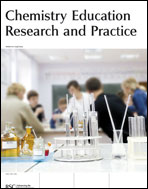Students' understanding of acids/bases in organic chemistry contexts
Abstract
Understanding key foundational principles is vital to learning chemistry across different contexts. One such foundational principle is the acid/base behavior of molecules. In the general chemistry sequence, the Brønsted-Lowry theory is stressed, because it lends itself well to studying equilibrium and kinetics. However, the Lewis theory of acids/bases is more broadly applicable beyond general chemistry, especially in organic chemistry, where direct correlations can be drawn between Lewis acids/bases and the underpinnings of mechanistic prediction. This study reports the outcomes of an investigation of organic chemistry students' understanding and application of acid/base theories in organic chemistry contexts. Participants completed problem-solving interviews, which included tasks related to acid/base understanding such as predicting acid strength and explaining nucleophiles/electrophiles. The results indicated that most students maintain declarative knowledge rooted in general chemistry training related to acids/bases, but they can't apply it in problem solving tasks. This assertion held true for most participants, whether chemistry majors or pre-professional majors. Further, flaws in student conceptual understanding of acid/base chemistry principles were revealed.

 Please wait while we load your content...
Please wait while we load your content...